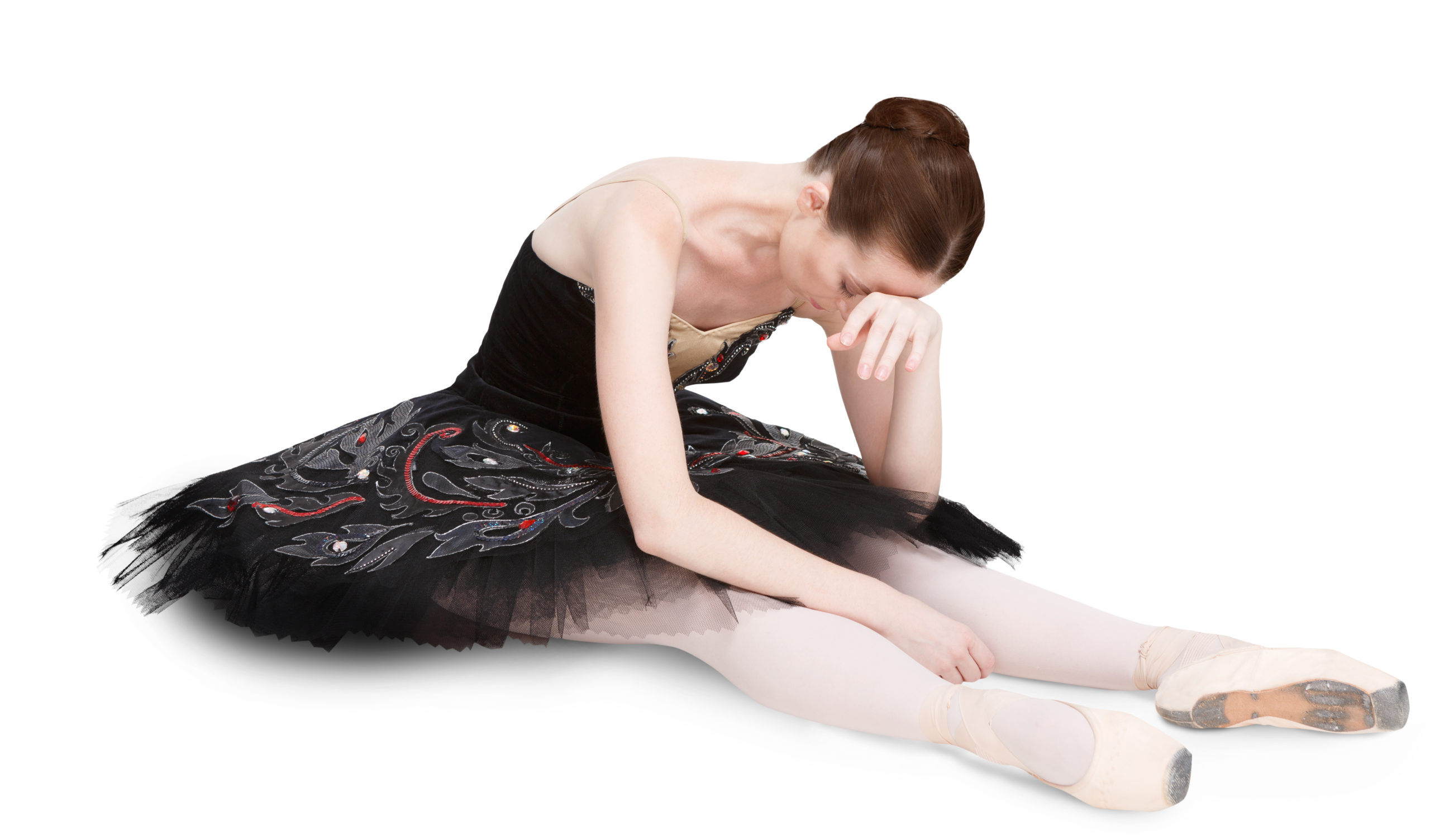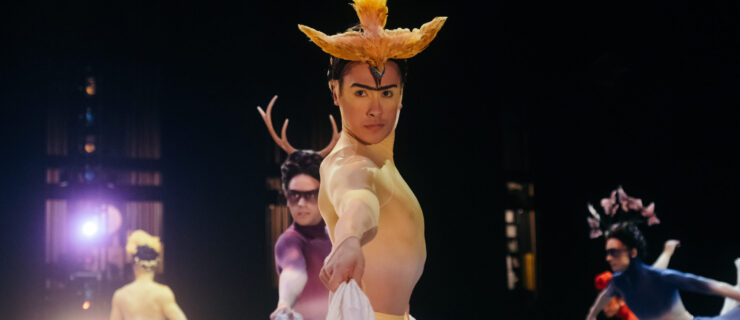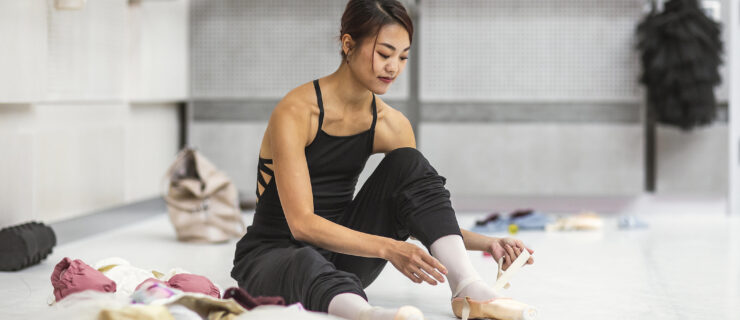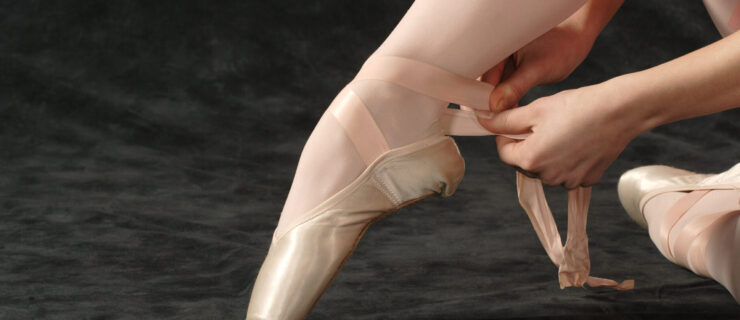Is Anxiety Holding You Back? What's Normal, What's Not and When to Seek Help
This story originally appeared in the December 2015/January 2016 issue of Pointe.
Lying awake in her hotel bed in Washington, DC, the night before her audition, Richmond Ballet dancer Valerie Tellmann-Henning was tormented with anxiety. At 31 years old, she was comfortable in her career. So comfortable that she decided to seek new artistic challenges. With the support of her director, she decided to audition for The Suzanne Farrell Ballet with the hope of juggling two contracts. The only thing that stood between her and her goal was a bout of anxiety. “I felt like I was 19 again trying to get my first job,” she remembers. “It made me second-guess a lot of things about myself: Is Suzanne going to like my body type? Will my legs be high enough?” The anxious feeling made Tellmann-Henning irritable, and she even found herself holding her breath during the audition class, as a stream of insecurities cycled through her mind.
Anxiety is an irrational sense of fear that pairs perfectly with perfectionism. Most, if not all, ballet dancers will feel anxious from time to time. In fact, the psychologists we spoke to said it is one of the most common reasons dancers come to them for treatment. While a dash of nerves before you go onstage can add electricity to your performance, anxiety can kill your confidence and even limit your ability to live your life normally if it goes unchecked. In a field that’s filled with stressful situations—like casting, audition jitters, contract renewals, mounting bills and stage fright—it’s important to learn how to identify anxiety, evaluate the seriousness and take steps to cope with it before it holds you back.
Anxiety 101
 Even seasoned pros like Valerie Tellmann-Henning face anxiety. Here’s Tellmann-Henning in George Balanchine’s Mozartiana with students from The School of Richmond Ballet. Photo by Sarah Ferguson, Courtesy Tellmann-Henning.
Even seasoned pros like Valerie Tellmann-Henning face anxiety. Here’s Tellmann-Henning in George Balanchine’s Mozartiana with students from The School of Richmond Ballet. Photo by Sarah Ferguson, Courtesy Tellmann-Henning.
“Dancers are kind of a self-selected pre-anxious population,” says Dr. Brian Goonan, a psychologist who works with dancers at Houston Ballet. “Wanting to go out there and please and perform is part of what creates the anxiety in the first place.” But anxiety has many mental and physical symptoms, meaning that each dancer will show it in a slightly different way. According to Dr. Nadine Kaslow, a psychologist who works with dancers at Atlanta Ballet, physical symptoms include a fast heartbeat, sweating, shaking, diarrhea, stomach pains, difficulty sleeping, trouble concentrating, shortness of breath or headaches. Mentally, you may feel a sense of dread or panic, or worry that things are going to go wrong. Most often, Kaslow says, anxiety manifests itself in some combination of both kinds of symptoms.
As the manager of Kansas City Ballet II, Anthony Krutzkamp sees this firsthand, since he works with dancers at one of the most stressful and uncertain periods of their careers—the space between student and professional. “Mostly, I see that they are worried about the future,” he says. “So much so that I don’t think they are enjoying the present.” Krutzkamp says that his dancers become most anxious over things they can’t actually control, like casting, how many company positions will open up or how the director or other dancers perceive them. “It all comes from that underlying feeling that they haven’t made it yet,” he says. While your perfectionism and desire to succeed help you maintain the focus required to become a great dancer, those same qualities can leave your head spinning with uncertainty.
Creating Balance
 Drawing or writing in a journal can both be useful in managing anxiety. Photo by Daniel Chekalov via Unsplash.
Drawing or writing in a journal can both be useful in managing anxiety. Photo by Daniel Chekalov via Unsplash.
Fortunately, since your mental and physical wellness are interconnected, there are concrete, tangible solutions to help manage anxiety. Because being a dancer is inherently stressful, Goonan says, it’s important to keep your mental and physical “resource pool” high. This means getting proper sleep, eating well to fuel your body and having “good emotional hygiene,” such as maintaining hobbies outside of dance and making time to unwind with friends.
In fact, if you are depleted physically, your mind will allocate more of its effort to sustaining your body. As a result, you will be less psychologically able to deal with things that make you anxious. “You can’t pull from a resource pool that’s drained,” advises Goonan, who says that dancers are more likely to experience anxiety when they are feeling run-down.
Creative and athletic hobbies actually have therapeutic effects and can be instrumental in managing anxiety. But since dance falls into both categories, it can’t serve as your sole emotional outlet and your job. Goonan encourages dancers to find creative or athletic outlets—like cooking, art or yoga—where the pressure of evaluation is off. “Draw, write in a journal or go bowling on Saturday nights with your friends,” he says. “Can you figure out the subtle nuance as to which cheeses to add to homemade mac and cheese?” Maybe you like swimming, sewing or want to learn to play the guitar.
Coping in the Moment—and Afterwards
 Krutzkamp coaching summer intensive students at KCB. Photo Courtesy Kansas City Ballet.
Krutzkamp coaching summer intensive students at KCB. Photo Courtesy Kansas City Ballet.
When you feel anxiety coming on, say while you’re backstage before a big performance, breathing and visualization techniques can help calm you down. “Imagine the situation making you anxious, and picture yourself handling it well,” says Kaslow. Deep breaths will also slow your heart rate.
If your anxiety is persistent over a long period of time, it may be worthwhile to evaluate if you are in the right company or training program for yourself and your health. “You are always the best dancer at the place that likes you the most,” says Krutzkamp. Sometimes the grass is actually greener somewhere else. Don’t be afraid of being open to moving to a place where you can handle the pressure and still push yourself to improve. “You’re not just changing grass, you’re changing directors,” he says. “Every company is very different.”
When to Seek Help
 Psychologists can help you to learn coping mechanisms to manage anxiety. Photo by Kira auf der Heide via Unsplash.
Psychologists can help you to learn coping mechanisms to manage anxiety. Photo by Kira auf der Heide via Unsplash.
Kaslow assures that a certain amount of anxiety is normal. “Some people tend to be more anxious than others and that’s okay,” she says. For example, if you are feeling anxious before opening night, Goonan says that’s reasonable. But if you are throwing up before the performance, the anxiety doesn’t lessen over subsequent shows or you experience debilitating panic attacks, he warns that you may have a disorder that needs to be treated.
Ask yourself: How often do symptoms show up? How long do they stay? And how intense are moments of anxiety when they happen? More specifically, are you able to perform, attend auditions and take class regularly, or do you find yourself passing up opportunities due to bouts of panic or an overwhelming sense of worry? Unfortunately, there are no universal benchmarks to tell you what frequency, length or intensity of anxiety is “normal.” But if it’s getting in the way of your life or your dancing, you need to be evaluated by a professional.
If you do go into treatment, Kaslow says that your first meetings will revolve around the psychologist getting to know you and your situation before they teach you specific coping mechanisms. “The only time you would think about medication with anxiety is if it is really quite significant,” she says. Traditional medications are highly addictive, so they are avoided if at all possible.
In Tellmann-Henning’s case, she sensed that her anxiety was rooted in her perceived shortcomings. So she worked to mentally refocus her thoughts on her strengths before‚—and during—the audition. It worked: She landed the job with The Suzanne Farrell Ballet, where she now dances when she’s not performing with Richmond Ballet.
“So much of being a dancer is being confident in what you can bring,” she says, but that’s not always easy, especially when anxiety comes into play. In hindsight, Tellmann-Henning says her bout of anxiety actually reinvigorated her love for what she does. “I think if you don’t have moments like that,” she says, “then maybe your heart’s not fully in your career anymore.”
3 Tips for Keeping Things in Perspective
1. Focus on your strengths as much as your weaknesses. “Instead of walking into class with a new teacher assuming that they will hate your extensions, remind yourself that you’ve got a solid triple pirouette to the left,” says psychologist Brian Goonon.
2. Understand the full range of your capabilities and know that you can’ t perform at your peak every day. Goonan asks dancers to spend two weeks rating their performance after each class on a scale of 1 to 10. Some days you will be a 2, but others might be an 8 or 9. “On any given day there are some things that you do well and some things that you do not so well,” he says. Adjust your expectations, and cut yourself some slack.
3. Control the controllable and let the rest go. For example, you can’t control it if an audition has multiple turning exercises and you hate turning. “But can you approach the turns with a positive attitude?” asks Goonan. “yes.”
Managing Anxiety with Breath and Visualization
Feeling anxious before a performance or audition? Try this deep-breathing exercise recommended by psychologist Brian Goonan.
1. Find a comfortable position sitting, reclining or lying where your torso can remain long. Place one hand on your chest and the other on your stomach.
2. Breathe in through your nose to a count of 3 and out through gently pursed lips to a count of 5. Take a 1-count rest after the inhale and exhale to create a smooth, 10-second cycle of 6 breaths per minute. Continue for 5 to 8 minutes.
3. Try adding this visualization while you breathe: Imagine cool, crips and refreshing white air entering your body on the inhale, and low-energy, negative gray air leaving you as you exhale.






